What's New
Displaying results 2811 - 2820 of 4052
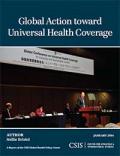
Resource | Publications,
As national incomes have risen across diverse countries--along with the burden of noncommunicable diseases--demand has intensified for quality, affordable health services. Many countries today are actively seeking to bring about universal health coverage--ensuring quality health services for all at a price that does not create undue financial pressure for individuals seeking care. The effort has stirred expanded interest and guidance from international organizations such as the World Health Organization and the World Bank, and led to new platforms for developing countries to learn from each other.
While universal health coverage will provide new funding and opportunities, including for the private sector, there is a need for dynamic, transparent negotiations among all health constituents, to forge enduring, feasible arrangements that ensure quality services reach all populations and make the best use of scarce health resources.
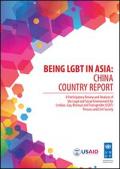
Resource | Publications,
This report documents the presentations and discussions from the China National Lesbian, Gay, Bisexual and Transgender (LGBT) Community Dialogue (16–18 August 2013, Beijing), the Asia-China Transgender Community Roundtable (11 November 2013, Beijing), as well as additional desk research.
The Dialogue generated a comprehensive overview of the social, cultural and legal environment where Chinese LGBT people live and LGBT NGOs operate and included in-depth discussions on LGBT rights in China in the areas of: health, education, family, media, community development, employment and the law.
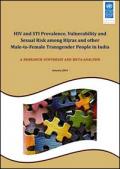
Resource | Publications,
In the current fourth phase of National AIDS Control Programme (NACP-IV), Department of AIDS Control is planning to scale up HIV prevention interventions among hijras/transgender people. The aim of this research synthesis was to summarise the current information on the prevalence of HIV and sexually transmitted infections (STIs), and the extent and contexts behind sexual risk behaviours among male-to-female (MtF) transgender populations. This synthesis is expected to inform current and future actions to address the HIV/STI-related health needs of MtF transgender populations, and contribute to fine-tuning HIV programme and research agenda.
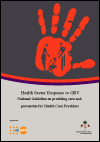
Resource | Publications,
Gender –based Violence (GBV), which is a gender neutral term by definition, but affecting mostly women, and cutting across all strata of the society,
widespread both in the developed and developing world and Maldives is no exception.
The land mark study (WHLE Study) conducted in 2004 showed that 1 in 3 women aged 15-49 have experienced some form of physical or sexual violence during their lifetime. This includes intimate partner violence, sexual violence by family members, colleagues at work and stress, as well as childhood
sexual abuse.
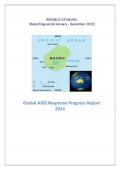
Resource | Publications,
This report provides evidence of raised expectations translated into figures and a ‘calling-to-account’ of the key players in the national response to AIDS. There is a rising expectation on the Nauru's government, not only to honour the commitment to the Political Declaration on AIDS endorsed in 2011 but also to ensure that the interventions set out to reach the commitments are successful, constructive and accountable. Common objectives such as reaching ‘Universal Access to Prevention, Care and Treatment’ and the Political Declaration of 2011 helped realize that HIV is one of the world’s challenges which is too interconnected and complex for any country to handle. These challenges further consolidate the need for greater collaboration between government and civil society.
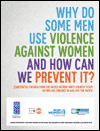
Resource | Publications,
The report, entitled ‘Why Do Some Men Use Violence Against Women and How Can We Prevent It? Quantitative Findings from the UN Multi-country Study on Men and Violence in Asia and the Pacific’ was conducted in Bangladesh, Cambodia, China, Indonesia, Sri Lanka and Papua New Guinea. It explores the prevalence of men’s use of violence against women in the survey sites, and shows what factors make men more or less likely to use violence.
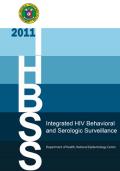
Resource | Publications,
In 2011, the fourth round of the Integrated HIV Behavioral and Serologic Surveillance (IHBSS) was led by the Department of Health. The IHBSS would provide crucial strategic information that would influence and provide direction for policies, programs, and services to help address the escalating epidemic of HIV in the Philippines and its consequent burden. The most-at-risk populations (MARPS) were included in the surveillance and in this report - Males who have sex with Males (MSM), Female Sex Workers (FSW), and Injecting Drug Users (IDU).
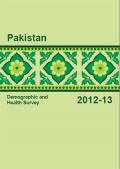
Resource | Publications,
The 2012-13 PDHS specifically collected information about knowledge and practice of family planning, fertility levels, marriage, fertility preferences, child feeding practices, nutritional status of children and women, childhood mortality, maternal and child health, awareness and attitudes regarding HIV/AIDS, knowledge about other illnesses (e.g., tuberculosis, hepatitis B and C), and domestic violence. Information on the above-mentioned topics was mainly collected from ever-married women; however, some of the information was also collected from ever-married men. The collected information will provide a database for evaluation of relevant ongoing projects and can assist policymakers in developing appropriate strategies and plans for future projects.
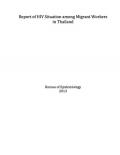
Resource | Publications,
The Bureau of Epidemiology has developed the Integrated Biological and Behavioral Surveillance system among migrant workers for the first time to understand HIV situation among this population. It is used as a means to monitor HIV epidemic and to evaluate the program. In 2010, the first round of the surveillance survey was conducted and repeated the second round in 2012.
This report includes the results from both rounds, but the analysis in certain dimensions are yet to be included to yield comprehensiveness of migrant situation, which will be addressed in the next round of surveillance survey.
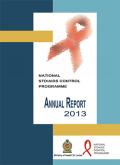
Resource | Publications,
National STD/AIDS Control Programme (NSACP) is a specialized public health programme of the Ministry of Health, Sri Lanka. The Director of the NSACP in consultation with the senior management team (SMT) provides leadership and technical guidance to both preventive and curative services provided by NSACP.
This report presents data collected and collated primarily from the STD clinics distributed islandwide to describe the epidemiology of STI and HIV and to document programmatic efforts to control STI and HIV infections in Sri Lanka during the year 2013.





